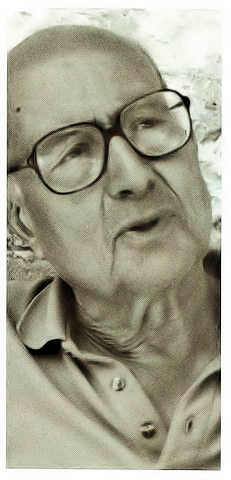Other Links
Editorial Board
- Editor - Bill Kenny
- London Editor-Melanie Eskenazi
- Founder - Len Mullenger
Google Site Search
SEEN
AND HEARD INTERNATIONAL RECITAL REVIEW
From Bach to Debussy - Piano Recital by
George Hadjinikos:
Horto / Pelion, Greece, 17.8.2008 (BM)

George Hadjinikos
Having devoted much of his life to music education (mainly in the
UK, but his summer master classes in his native Horto have also
become a tradition), it is no wonder that this evening, too, was
conceived as a lesson, entitled “A Living Journey Through the
History of Music from Bach to Debussy” and including brief
introductions to the pieces he was about to play. And he embarked on
this journey with an enduring Furtwängler quotation: “The issue
today is no longer what makes for good or bad music, but rather
music per se, what we mean when we use the term music.”
(Es
geht heute nicht mehr um gute oder schlechte Musik, sondern um Musik
schlechthin.)
Choosing Bach’s Prelude and Fugue in C major (from the 2nd
book of the Well-Tempered Clavier) as a point of departure – and
remarking in passing that the Fugue was of more academic than
humanistic value, he moved on to the ones in F sharp major and F
sharp minor in the 1st book, observing that the former
was a celebration of nature - his translucent playing, serving as a
celebration of the fugue as an art form, so much more than just
recurrently bringing out the theme - and the latter a reflection on
the plight of mankind – or words to that effect. At 85, Hadjinikos’
voice is somewhat reduced, which made it difficult to catch
everything he was saying, but it soon became evident that this was
not all that important: he was saying everything he needed to when
he sat down to play.
Next, after reminding us of how “Papa”
Haydn succeeded in infusing seemingly simple forms with so much
ingenuity that “nothing new came after him”, and referring to
Mozart’s genius and how he changed the world of melody, he chose
several movements from two of their lesser-performed sonatas – the
Allegro from Haydn’s Sonata in E flat major HobXVI: 28 and the
Adagio and Menuet I & II from Mozart’s K282 in the same key.
Particularly the Haydn was performed with such affection for every
single note that I couldn’t help but be reminded of Richter’s
fondness for this composer’s works, so often underrated and deemed
appropriate study fare for ‘intermediate’ students only.
I
caught very little of the introduction to the moody and pained Largo
e Mesto (followed by the Menuet & Trio) of Beethoven’s Sonata no. 7
in D major, but again, this was irrelevant, since it was all there
in the music. The second movement of this sonata has been described
as Beethoven’s
first sojourn into the tragedy of existence, and Hadjinikos conveyed
to us not only every subtle shade of the composer’s melancholy
mindset, but also the beauty of the music born from it.
There was no ‘prologue’ to the Brahms Rhapsody in G minor which came
next – actually, I had felt a little disappointed when I saw it on
the program, wasn’t this the kind of piece that led people to
misunderstand Brahms’ music as ‘heavy’? But clearly this was because
I had never heard the Rhapsody played quite like this before,
without a trace of the Sturm & Drang style most pianists
bring to it, completely devoid of all haste and more intense than
ever – I wish there were a recording of this.
Much the same is true of the momentous interpretation of one of
César Franck’s last compositions, the epic Prelude, Aria and Finale,
which followed the interval. Before he set out on this separate
voyage within the evening’s journey, and following an anecdote about
how popular Franck’s music was in pre-war Greece – in his youth, the
poet Angelos Sikelianos had once asked him to play Franck for him,
saying that this was the only music he listened to - Hadjinikos
mentioned that to him, the Aria was essentially a prayer…and nothing
could have been more fitting. His performance was perhaps less
technically disciplined than lyrically delicate, but most important
was his sensitive touch – exactly what is required to rekindle
listeners’ appreciation of this masterpiece. It was not difficult to
deduce from Hadjinikos’s next introductory lines that he is
particularly partial to Debussy and the completely new approach he
devised to harmony and the flow of music, as well as his ability to
convey the feeling of eros in the pure sense, which he chose
to demonstrate with Preludes no. 1, 8 and 10, while closing with
‘The Joyous Island’ - and Grieg’s Lullaby as an encore, in view of
the late hour, as he remarked half jokingly (and indeed it was
almost midnight).
Throughout the evening, it was as if he
were playing to each member of the audience personally; intent on
conveying his message of humanism, he focuses on the significance of
music for humanity, for each and every individual listening to him,
and expresses what cannot be put in words.
I
left the recital longing to get home and play some of these pieces
myself, and wondering whether this feeling of discovery was anything
similar to what it must have been like for Hadjinikos when he
happened on those lost Skalkottas* manuscripts in a second-hand
bookshop in Berlin.
Bettina Mara
*George Hadjinikos is an authority on Nikos Skalkottas, and
the author of a recent book about this 20th century Greek
composer (unfortunately available in Greek only to date). The
complete opposite of an academic treatise, the footnotes are almost
more engrossing than the main text. Hadjinikos chose not to play
Skalkottas at this recital, attesting to the fact that, fortunately
for his audiences, self-projection is not an issue for him. Read
more about this artist at:
http://en.wikipedia.org/wiki/George_Hadjinikos
Back
to Top
Cumulative Index Page
